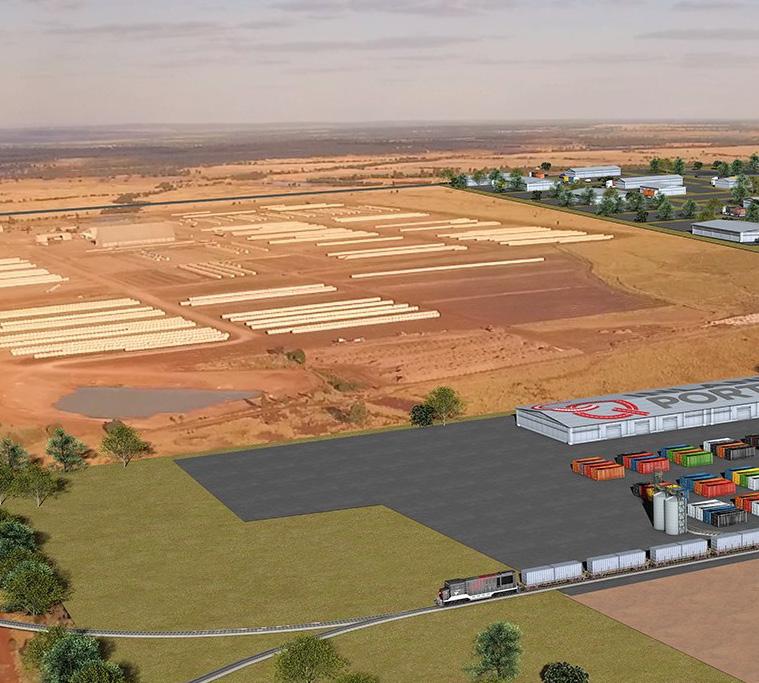








CHDC’s Snapshot provides an insight into the achievements and key outputs for the year.
An overview of CHDC’s Response and Support Plan for local business, industry and government.
Looking back on the progress of CHDC and the Central Highlands since FY18.

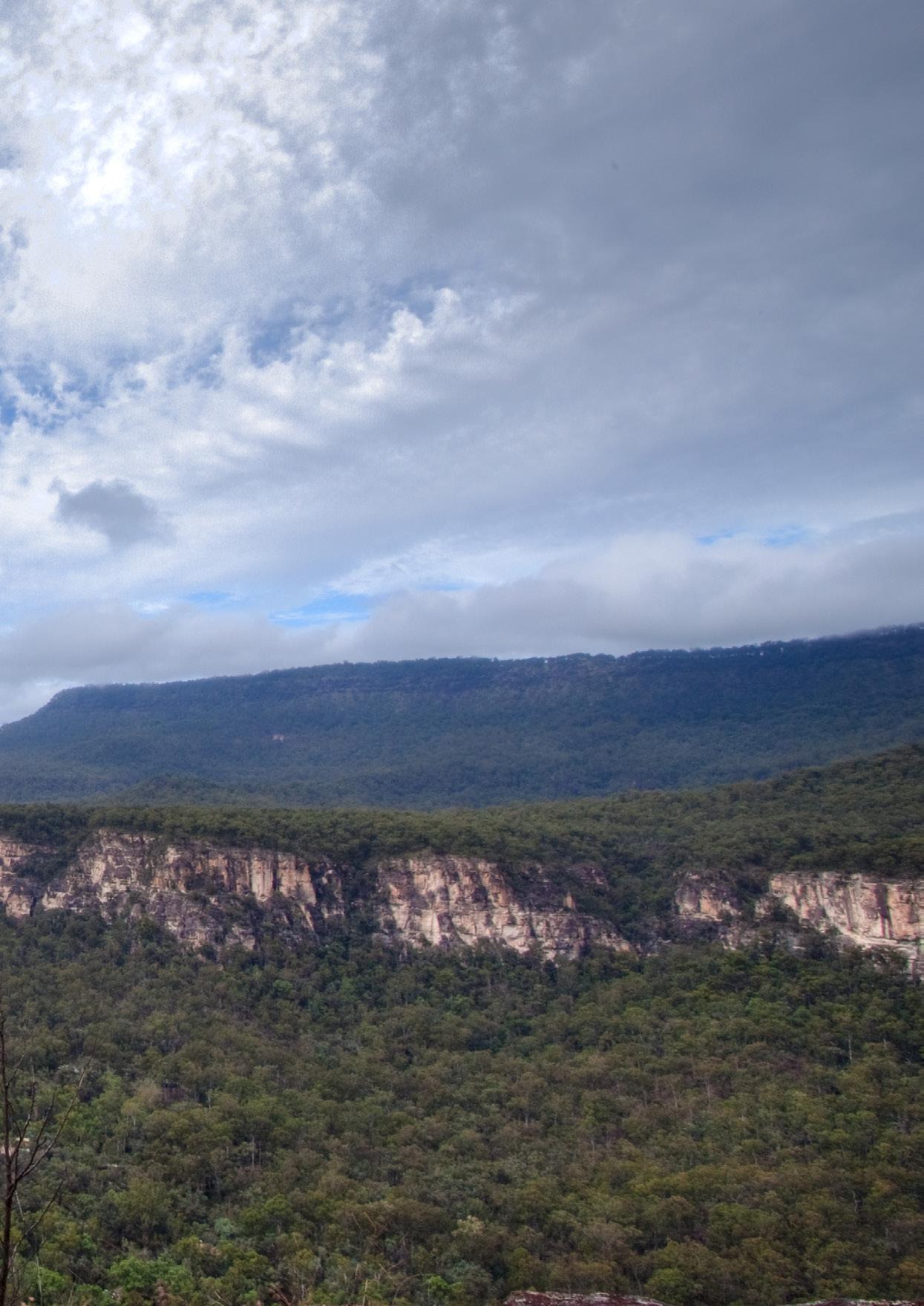
There will be many reports prepared by organisations and corporations all over the globe regaling the significant disruption of the COVID-19 pandemic to their operation in this year.
Clearly, much of its effects were detrimental to planning outcomes and incomes and yet strangely and perversely creating opportunity.
The Central Highlands region at the date of this report has largely traversed the disruption extremely well due in no small part to our significant diversity. Our response to the changing environment created by the virus will be spearheaded by a dedicated Highlands in Transition position within Central Highlands Development Corporation (CHDC) to ensure that our strategies, government responses and ability to leverage opportunities for funding are maximised. There will be significant learnings from our adaption to the “new economy” and we will need to be resourceful and agile in a very competitive recovery period.
Despite these challenges, the Corporation continues its drive to continue to build on the region’s strengths. Our board has been extended to include three independent directors to complement its four Central Highlands Regional Council (CHRC) directors. This provides a perceptively diverse range of skills to our board and a new dynamic perspective to our strategic direction. We welcome former Deputy Premier Mr Paul Lucas, gas industry figure Mr Ciarán Hallinan and Central Highlands businesswoman Ms Bronwyn Roberts to the team to join Cr Christine Rolfe, Cr Megan Daniels and CHRC CEO Scott Mason.
As the saying goes, “you win some, you lose some” and Chief Executive Officer Mrs Sandra Hobbs leaves CHDC at the end of her contract this year and retires. Over 11 years, Sandra and her directors, staff, partners and clients have built this humble corporation from two staff and an annual budget of $240,000 into the current stellar configuration of 14 staff and an annual turnover of $3m. I am proud to say that CHDC is considered one of the State’s most effective and innovative regional economic development organisations and much of this is due to Sandra’s hard work, perseverance and dedication, complemented by her engaging and inclusive disposition. It is a rare gift that our region has had the benefit of and we wish her all the best for the future.
In a year of two parts, we established and progressed our focus on the Visitor Economy Strategy with the Tourism Advisory Panel (TAP), Tourism Advisory Network (TAN) and Tourism Advisory Group (TAG), which was fortuitous as tourism, accommodation and hospitality took the biggest hit from the pandemic restrictions. We look forward to a strong focus on building our brands, creating resilience and identifying new opportunities as we transition from restrictions and start travelling again.
The AgFrontier Regional Agtech Incubator concluded with a virtual road trip via Zoom, around the locations of its cohort members who did their final pitches. Ironically, innovation and technology created the opportunities for the participants, and it was a somewhat fitting end.
The value, content and considerable foresight that lies in the Central Highlands Economic Master Plan (CHEMP) have been extraordinarily accurate and insightful. It has been gratifying to know that the outcomes sought in the plan are relevant and strangely prophetic as we deal with our changed future. It is a robust document and will serve us well.
In conclusion, I welcome Mr Arjan Bloemer as our new Chief Executive Officer early in 2020-21 and look forward to his incredible enthusiasm and aspiration for our region. I’d like to think that the incredible reputation of our organisation will continue to inspire all of our CHDC team with their new leader to even bigger and better things. Their work and dedication has been a powerful example to our communities and I know that our future is in good hands.
Cr Kerry Hayes Chair, Central Highlands Development Corporation Mayor, Central Highlands Regional Council
The past year has been a unique combination of highs and lows that have brought significant challenges to the team at CHDC and Central Highlands businesses. Fortunately, these challenges have been balanced by some significant achievements and the occasional celebrations, with the team at CHDC responding to provide updated information, consolidate a number of key projects and collaborating with stakeholders to adapt initiatives that respond to the unexpected challenge of a global pandemic.
It was gratifying to bring to maturity several initiatives as we entered a phase of review and renewal in the third year of the Central Highlands Economic Master Plan (CHEMP). For example, Central Highlands Accelerate Agriculture (CHAA) – with its associated projects such as AgFrontier Regional Agtech Incubator and the biennial AgTeCH forum and field day – cemented its place as the driver of growth and innovation in the region’s agriculture sector. Also, CHDC’s faith in the region’s tourism and events industry culminated in the delivery of the Central Highlands Visitor Economy Strategy 2020-22, an ambitious but achievable vision that will be brought to fruition through stakeholder collaboration. We were again able to showcase the region’s diversity and resilience with another successful biennial Central Highlands Business Excellence Awards in 2019 and it is a credit to those businesses to see how they have continued to strengthen and pivot in response to a constantly changing economic environment.
The year started with a significant milestone in CHDC’s evolution with the addition of three independent, skillsbased directors to the CHDC Board – Paul Lucas, Ciarán Hallinan and Bronwyn Roberts. They each bring a vast bank of knowledge and experience in their specialised fields of government, infrastructure development, resources and agriculture. Their expert input and fresh perspective is going to be immensely helpful to CHDC as we rise and adapt to new opportunities and challenges for the Central Highlands.
COVID-19 certainly threw a spanner in the works in the latter half of FY20, bringing a temporary halt to several projects and forcing the CHDC team to work remotely. However, it also provided an important opportunity to enhance and diversify our support of, and engagement with, local businesses to help them navigate unchartered and ever-changing waters. It’s difficult to predict the future direction of the pandemic and its impacts on our region but I hope the community is assured that CHDC continues to plan and adapt accordingly.
With my retirement at the end of FY20, Arjan Bloemer has been appointed to step into the CEO role. Mr Bloemer hails most recently from Toowoomba, where he was an independent advisor to company boards and executive level managers. He has previously worked across a range of industries and regions in Australia in senior executive and managing director roles with companies such as Heritage Bank, Accenture and Ernst and Young. Mr Bloemer shares the Board’s firm belief that CHDC has a critical role in the Central Highlands’ future economic prosperity and I look forward to seeing the organisation aspirations and vision develop under his guidance.
Finally, thank you to the dedicated and skilled CHDC staff, Board Directors, stakeholders and partners with whom I have been privileged to worked alongside over the past 11 years. The Central Highlands is recognised as a strong, diverse, resilient heavy hitter in the nation's economic future and I’m proud to have been part of a team of people who have been dedicated and strong contributors to that ongoing success. I am going to miss working alongside all those people who have been a major part of my life and the significant stories, experiences and memories that I will take with me into retirement.
Sandra Hobbs Chief Executive Officer
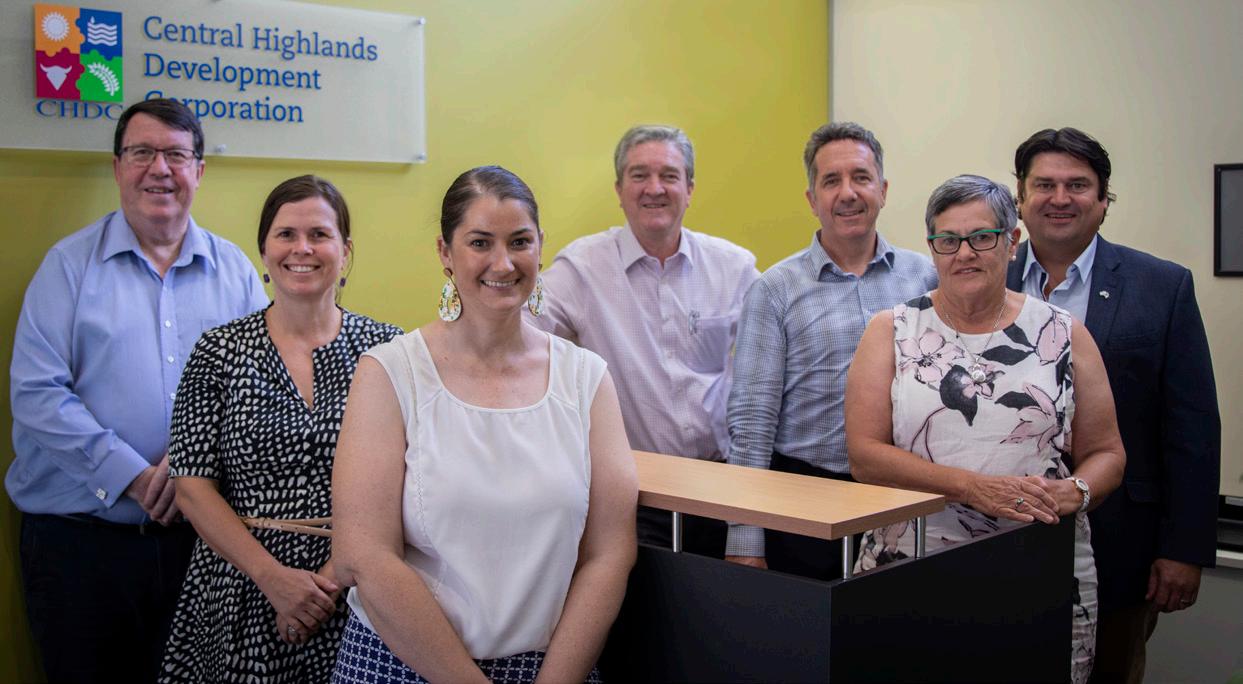
$ 6.31 bn Gross Regional Product
$ 1.9 m+
Project funding for 2019–20
$ 73 k+
21 CHDC events and business support workshops
$ 1 bn Agribusiness economic value with 1.37m head of cattle and about 2 million ha of strategic cropping land
$ 218.5 m Tourism total output
$ 1.806 bn Domestic imports from the Mining Sector
268
CQ Job Link average number of jobs advertised per month
Generated income from events, sponsors, merchandise sales and external parties, largely impacted by COVID-19: only 1 event in the second half of financial year, Visitor Information Centre closed during peak season April to June
112 Partners and sponsors for CHDC programs and events
$10.563bn Output generated across the region
173,302 Annual passengers through Emerald Airport
4 nights
Average length of stay for domestic & overnight visitors
$796.03m Mining Sector is also highest contributor in terms of local expenditure
6,079
Mining sector jobs out of the 17,019 jobs in the region
3,291 Businesses operating in the Central Highlands
24 Media releases distributed
265 + Attendees at AgTeCH19
Ongoing organisational review, addition of 3 Independent Board Directors, funding attraction to maintain program and service delivery for business and industry.
CHEMP Action Plan review; Annual Central Highlands Economic Profile and Development Register; COVID-19 response management; collective resource industry engagement and collaboration; CRC-TiME supporting partner.
Brad Stallard Regional Skills
Regional Skills Investment Strategy including Supervisors and Managers Training to fill local workforce skills gap; CQ Job Link.
Supported more than 5,000 SMEs with resources and guidance; almost 260 business visits across the region and 588 business support actions through workshops/forums/events.
Matt McIntyre Innovation

Supporting innovation across the Fitzroy region in final of three-year, $500k Advancing Regional Innovation Program, as part of the Advance Queensland initiative.
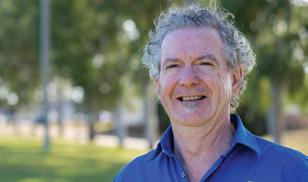




Liz Alexander Agribusiness
Ongoing delivery of CHAA, including Freight Task Analysis Survey, Northern Australian Cropping Research Centre of Excellence, grownincentralhighlands.com.au, AgTeCH19.
Sonya Comiskey Agtech

Delivered inaugural AgFrontier Regional Agtech Incubator, which equipped a cohort of ten start-ups and spin-offs with knowledge to establish, develop and export agtech product and services.

Delivered and began implementation of Central Highlands Visitor Economy Strategy 2020–2022.

More than 7,300 visitors and $16k in merchandise sales at the Central Highlands Visitor Information Centre. Added more local products, including Like Mum Used to Make relish.
Kylie
More than 20 CHDC workshops and events across the region, which attracted 800+ attendees and 110+ corporate and government sponsorships.
A 77 percent increase in followers across 5 social media platforms; more than 20k website visitors; fortnightly eNews and weekly COVID updates to 1,200 subscribers.
Signage, brochure and social media video for Central Highlands Mining Trail; development of advocacy collateral; analysis and development of fact sheets; Development Register and officer support.
Kelly
Financial management of CHDC, including ongoing transition from Reckon to Xero financial software, COVID adjustments, implementing new payroll system, worked with accountant to produce new financial board reports and training in leadership.
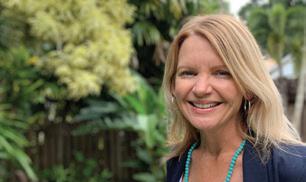






Hayley
Coordinated office relocation; compiled weekly Tap into Tenders list to help local businesses access the latest opportunities.
The second half of this reporting period overlaps with the initial impacts of the global Coronavirus pandemic. Like many other organisations, CHDC had to adapt on the run to effectively support our region’s business, industry and government.

COVID Response and Support Plan overview:
+ Daily team situation reports
+ In excess of 19,000 engagements via in-person contact, emails, calls and video meetings
+ Dedicated COVID-19 section on CHDC website, updated daily.
+ Government program and grant writing support
+ Industry and government briefings
+ Facilitating regional solutions for business and industry
+ Active participation in the Local Disaster Management Group
In addition, CHDC commissioned REMPLAN to undertake the following pieces of work to capture and quantify the impacts and opportunities from the pandemic to date:
+ COVID-19 Economic Impact Assessment
+ Historical Events (Global Financial Crisis and recent mining downturn) Comparative Economic Impact Analysis
+ COVID-19 Business Activity Survey
This work will be completed in FY20–21.
Bringing the resources sector from across the Central Highlands together through the Mayor’s Resources Roundtable was the start of an incredibly important approach to collective engagement.
A key focus for CHDC is the ongoing management of the delivery of the CHEMP Action Plan 2017–2022, which encompasses four pillars, 16 objectives, 36 action items and 93 key performance indicators. The pillars are Export Drivers, Population Services, Workforce and Governance. In partnership with the Central Highlands Regional Council (CHRC) and other key stakeholders, the review of the Action Plan was completed in 2019. This has positioned the group to refresh the Action Plan and forge ahead on further delivery.
The Central Highlands has played its role to initiate a national project aimed at defining transformation approaches to mining economies.
The Cooperative Research Centre for Transformations in Mining Economies (CRC-TiME) Ltd company has been formally registered with ASIC after the Federal Government committed $29.5 million for the project.
CHDC is among 75 partners who have supported the project, which is jointly led by the Universities of Queensland and Western Australia.
The CRC-TiME will undertake social, environmental, economic and technical research; work directly with industry and communities; and enable Australia to transition to a prosperous and sustainable post-mining future.
CHDC chose to be part of the collaboration because, with coal mining being a major economic pillar of the Central Highlands, our region stands to be a direct beneficiary of potential research outcomes.
We are currently world leaders in coal mining, and with collaborative research and development now, we could position the Central Highlands as a world leading region in economic transformation.
An important function of a regional development organisation is the provision of relevant information and data. Key pieces of work delivered include the Central Highlands Economic Profile and Development Register. The annual Economic Profile, with data provided by REMPLAN, plays an important role in equipping business, industry and government with key information.
So too does the Central Highlands Development Register, which canvasses the state of approvals and investments in infrastructure, housing, commercial development, mining and construction, health, education and energy across the region.
This information, as well as REMPLAN’s Online Central Highlands Economy and Community Profile, is available on chdc.com.au.
Every mine has an end-date – albeit this could be some decades away – so continued testing of economic diversification opportunities is crucial to the long-term sustainability of communities who’ve depended on those mines.
This is where the CRC-TiME comes in – undertaking world class research and development in resource regions for the benefit of all. Three programs focused on: regional economic development; valuation, economics and mine planning; and operational solutions and mining equipment, technology and services (METS) development are planned to facilitate restoration activities and a supply of mine closure and post-closure products and services. Other partners in the CRC-TiME include leading mining companies, the Minerals Council of Australia, METS companies, regional development organisations, local, State and Commonwealth governments and research partners.
Key governance has been developed that will underpin the establishment phase of the CRC, including the appointment of its foundational board and recognition of its founding constitution.
The Federal Government’s CRC Program provides competitive and merit-based grant funding to support industry-led collaborative research partnerships.
The CRC-TiME has generated a further $105 million in cash and in-kind contributions from industry and researchers.
In a joint initiative with CHDC, Central Highlands Mayor Kerry Hayes invited all operating coal producers to attend the inaugural Central Highlands Mayor's Resources Roundtable in October 2019.
The intent was to offer the opportunity for the resources sector, CHRC and CHDC to establish a new approach to collaboration.
With CHDC as the group’s key coordinator, outcomes of value are as follows:
+ Building industry and Council relations
+ Networking
+ Information sharing
+ Identifying collaborative projects
+ Collective advocacy
In addition, the key topics of interest are:
+ Workforce (skills, FIFO, career perception)
+ Liveability
+ Infrastructure planning
As an ongoing driver of the Queensland Local Content Leaders Network (QLCLN), CHDC continues to position the value of local content with industry and government. This network is made up of councils, regional development organisations, industry groups, peak bodies, social enterprises and industry across the resource regions of the Bowen, Surat and Galilee Basins. We held three meetings in Brisbane, hosted by BHP, Origin Energy and the Port of Brisbane over this period and numerous working group meetings via video conferencing.
+ Local supply
+ Community spend
+ Air travel (routes and fares)
+ Industry promotion (locally and regionally)
+ Rehabilitation (cross sector opportunities)
+ Regional transformation (automation)
+ Post mine futures
+ Local Disaster Management Group emerging issues e.g. COVID-19 response process
The last topic on the list has seen the group engage with the Local Disaster Management Group and the health sector, amongst others, to share best practice in approaches to enforce compliance with the current COVID-19 restrictions.
CHDC looks forward to its continued involvement in this group, which holds enormous opportunity to play a significant role in further advancing the region’s economy.
The QLCLN finalised the development of the Local Content Model and Definition of ‘Local’ White Paper and created collateral titled “Keeping it in the Regions”. This is due for public launch in the second half of 2020. Through this network, CHDC also contributed to the Queensland Resources Council (QRC) 2019 Effectiveness Report, which focuses on the Queensland Resources and Energy Sector Code of Practice for Local Content (2013) and showcases local business 4T Consultants.
$ 516,000 across three years from the Local Buying Foundation to continue to deliver targeted business support
258 business visits
CHDC’s Business Facilitator is a threeyear role, currently in its final year of the funding agreement with the Local Buying Foundation, to provide targeted, one-on-one support to help build business capacity in the Central Highlands.
In FY20, more than 5,000 local operations – primarily SMEs - received direct support for tenders, business planning workshops, grants and information. Almost 260 business visits across the region were undertaken by the Business Facilitator. Industry information and updates and networking opportunities were also delivered at the Economic Futures Forum, Industry and Innovation Forum, and Tourism and Events Forum, which together attracted 300 attendees.
CHDC’s Tap into Tenders list, containing local, regional and state procurement opportunities, was distributed to an average of 600 subscribers each week. With more than 50 tender lists compiled, almost 30,000 emails were sent over the course of the financial year. Tap into Tenders is also proudly funded by the Local Buying Foundation.
6,000 & 500 emails and telephone calls to businesses as part of COVID-19 Response & Support action plan
The 2019 Awards Gala Dinner was hosted on 14 September 2019, with 25 business finalists supported and 250 attendees in total. Maraboon Veterinary Surgery was announced as Central Highlands Business of the Year; Takarakka Bush Resort took home the publicly voted People’s Choice for Customer Service Award; and Fair Dinkum Meats and 4T Consultants were inducted into the Hall of Fame.
Eighty business operators attended the Awards’ Workshop Series, which was delivered as part of the Awards’ mission to build business capability.
The second half of this financial year brought with it the impacts and pivots in response to the COVID-19 pandemic. The Business Facilitator supported approximately 5,000 businesses from March to June with a range of resources, tools and guidance. Close to 1,000 phone calls were made, 12,000 emails sent, and more than 30 COVID-related webinars attended.
The Business Facilitator will continue to actively guide, mentor and support regional SMEs in the program’s final year. There will be a strong focus on adaptability and sustainability as the Coronavirus pandemic evolves. Building digital capability, particularly on social media, is another priority.
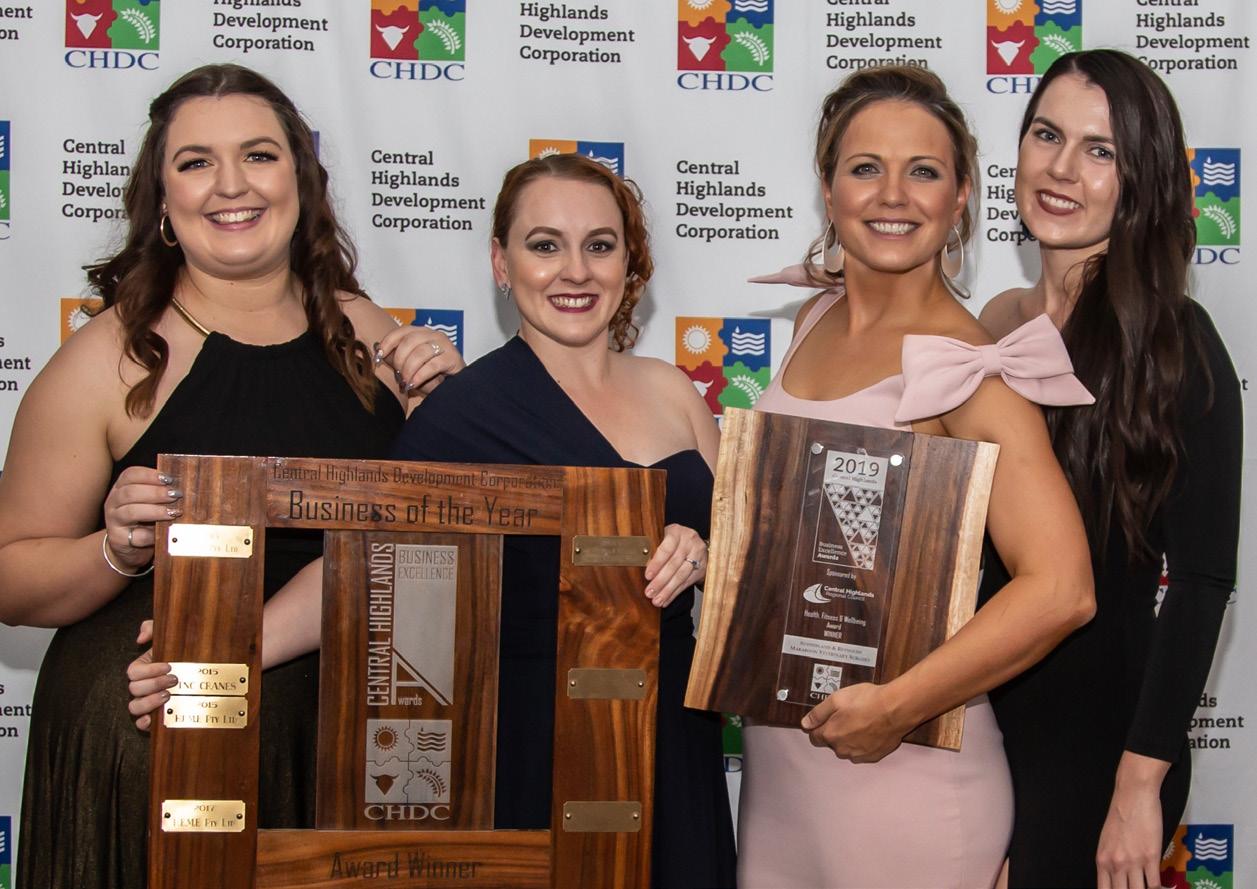
The survey was conducted from mid-February to midMarch 2020, to use as a key barometer of business conditions and the overall health of the economy.
The survey attracted 220 responses. The results will assist CHDC in identifying support requirements within businesses and communities of the Central Highlands.
The World Health Organization officially labelled COVID-19 a pandemic on 11 March, five days before the survey closed. Consequently, a majority of responses were submitted before businesses were aware of the impact the pandemic would have on the region.
A follow-up survey is being conducted in July-August 2020 to gauge the pandemic's impact.
+ Business performance over the past 12 months was solid, with 78% of respondents reporting their business had performed the same or better (compared to the 12 months before).
+ Business confidence was positive, with 82% of respondents anticipating their business would perform the same or better over next 12 months. 71% of respondents anticipate the local economy will perform the same or better over this period.
+ A majority of respondents anticipate profitability (72%), employment levels (86%) and capital investment (91%) will stay the same or increase over the next 12 months.
+ Rising operating costs continues to be an issue for local business, with 75% experiencing an increase in costs over the past 12 months and 63% anticipating an increase over the next 12 months.
+ Respondents identified customer demand/economic activity (41%) and climatic conditions (37%) as the top constraints to growth.
To complement this survey, CHDC, in partnership with REMPLAN, will conduct another business survey to better understand the impacts, opportunities and outlook relative to COVID-19. The results are due in the second half of 2020.
1,097 Employment
$ 218.5 million
total annual output
678,000
Domestic and international visitors per annum
The Central Highlands visitor sector entered an exciting, new phase of pro-active growth in FY20 but in contrast, the COVID-19 pandemic also gave rise to some extreme challenges. Nevertheless, tourism continues to be an increasingly valuable industry for the Central Highlands, worth an estimated $218.5 million annually.
The development of a strategy to drive tourism, regional dispersal and increase length of stay throughout the Central Highlands was the main game for the first part of FY20, with funding support from the Local Buying Foundation. The final document – Central Highlands Visitor Economy Strategy 2020–2022 – was an amazing achievement by industry, the community and CHRC. The extensive collaboration right across the region, several drafts, meetings and further engagement resulted in the first ever tourism strategy to have universal buy-in and ownership from all stakeholders in the Central Highlands. Not only has the plan been well received, it will drive all the work CHDC does in the tourism development and visitor economy space for the next three years.
Key Project Areas that have already been initiated are:
+ Visitor Engagement – in response to COVID, CHDC pivoted its services to primarily be online, displaying QR Code posters across the region to promote the Central Highlands Visitor Guide and Touring Map, which are key promotional collateral for the region. The regional Visitor Information Centres of Duaringa and Blackwater were set to employ paid staff for the first time but unfortunately the COVID shutdown forced this initiative on hold indefinitely.
+ RV Management Policy
+ Experience Development & Marketing Program
These groups have achieved increased engagement and collaboration over the past 12 months. In particular, key tourism businesses, local councillors and government representatives from across the Central Highlands have been actively involved in the Tourism Action Group and Tourism Advisory Panel. The Tourism Alliance Network has also attracted engagement from Community Reference Groups from all over the region.
The annual forum in November 2019 attracted in excess of 60 attendees, which was more businesses, community members and local government representatives than ever before. The guests gained valuable insights from expert speakers from Tourism and Events Queensland and Queensland Tourism Industry Council and some of the best tourism and events leaders in the country. The Q&A and mentoring sessions were very popular and well received.
The forum was also the launching pad for the new Central Highlands Visitor Economy Strategy 2020-2022 and the Central Highlands Mining Trail.
As the pandemic forced a massive scaling back of tourism operations in the Central Highlands, indeed across the world, CHDC moved quickly to offer widespread support to the local industry. This centred around keeping operators informed on the ever-changing restrictions and protocols, and opportunities to pivot and prepare for re-opening when the time came.
Regular updates were also provided on government assistance, grant opportunities, and the many webinars and online workshops delivered by various tourism bodies across Australia.
The COVID shutdown was an opportunity to review collateral, which is a key part of visitor servicing and extremely popular with travellers. Brochures for the Emerald Botanic Gardens; Emerald Mosaic Pathway and van Gogh; Emerald CBD Artworks; and Lake Maraboon have been re-designed and updated. Copies will be professionally printed for dissemination throughout Emerald and be available online through QR codes and other digital means.
The Coronavirus pandemic put on hold this major tourism initiative, which is funded by CHDC and BMA, but it is hoped to be finalised in time for the 2021 tourism season. The Trail will be a 180km, self-drive route characterised by signage at key localities across the Bowen Basin – Capella, Lilyvale, Emerald, Blackwater and Bluff. The project’s first phase – the Gregory Crinum Mine Legacy video, which reflects upon the 36-year history of the mine complex –premiered at the Tourism and Events Forum in November 2019.
CHDC’s Tourism Development Coordinator has taken on the role of Secretary of the Committee that coordinates what’s coined as the ultimate Aussie road trip, an inland driving route from Sydney to Cairns and Cooktown. CHDC has overseen the development of a long-awaited, overhauled brochure and road map. A new website is also in the process of being researched and initiated. Partners
The Central Highlands Visitor Information Centre (VIC) in Emerald farewelled Sally Roberts, who passed away from illness in December 2019. Sally was a longtime volunteer at the VIC before accepting a position as Visitor Information Officer in 2008 and then Centre Coordinator in 2015. Sally welcomed thousands upon thousands of visitors to the Central Highlands and was always friendly, helpful and brimming with knowledge about our region. She is very much missed.

After many years as a casual and volunteer at the VIC, Pamela Gangadoo was appointed as the new Coordinator in early 2020.
The focus for 2020-21 will primarily be on delivering Priority Projects 1 and 2 of the Central Highlands Visitor Economy Strategy. Also aligned with the Strategy, CHDC will work with CHRC, the tourism industry and local communities to develop RV caravan and camping options and opportunities across the region. We will continue to provide support and guidance to industry operators as the pandemic evolves.
This three-year vision to develop a thriving visitor economy for the Central Highlands sets out how the industry can collaborate to attract more overnight visitors, increase income across the year and enhance the desirability of the region for work and play.
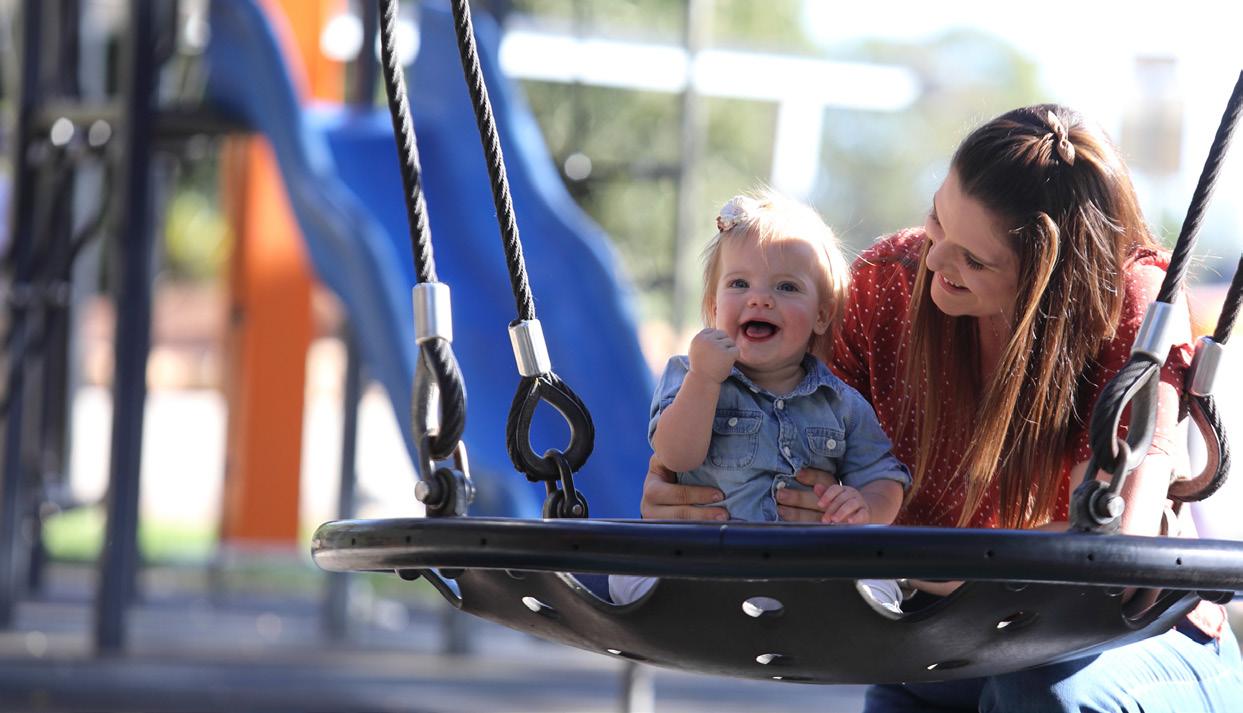
The Strategy identifies six priority projects. The first two critical stages are now funded and underway, ready for completion by the end of 2020.
Brand stories matter! A brand story is required to provide a clear and consistent identity in the eyes of visitors and the tourism industry.
Central Highlands as a brand is not well known and does not create a clear connection with this unique part of Queensland for visitors as there are many other regions of the same name. A destination brand is the sum of the experiences, from the initial Google search to the end of their stay. It is the value visitors get from the destination –functionally, emotionally and socially.
The brand and identity will form the basis for the Central Highlands’ tourism marketing and communications. Key messages and language will be created to assist the region’s tourism industry and local communities to share and promote the story and build local pride and ownership in its telling.
Events are an important marketing tool for the region. They can enhance awareness and draw visitors. Events are also vital to the health of the community as they increase pride and a sense of connection. Rather than attracting new events, the focus will be on maximising value from the region’s existing events. A coordinated events calendar will prevent date clashes and capacity issues for event managers and will enable collaboration amongst tourism operators and other businesses around cross promotion to encourage event visitors to stay longer.
A seasonal events marketing campaign will not only harness the local community as tourism ambassadors for the region but also support the drive market in planning their travel itinerary to incorporate regional events. When people are well informed of what is on, they can influence the number of travellers and those visiting friends or relatives in the region and spending in the local economy.
Towards the end of the financial year, CHDC successfully secured funding to achieve Priority Projects 1 and 2. This is a strong start and builds a promising foundation for the strategy to be implemented in full over the coming years.
CHAA Pillar Strategy
Production Excellence
Connected Competitive Supply Chains
Cultivate and promote agribusiness capability to fully utilise resources and sustainably grow the value of production
Strengthening the Central Highlands region’s role as the gateway and hub to Northern and Western Queensland
Revered Regional Brand(s) Build a revered region by promoting its premium products and services
Ready for Business
Grow investment and supply-chain ready businesses within the Central Highlands with national and global market potential
Fearless Invention Foster knowledge-intensive and high-tech industries and communities within the Central Highlands to power future economic opportunity
CHDC’s Central Highlands Accelerate Agribusiness (CHAA) initiative marked three years of implementation in October 2019. CHAA identifies the competitive advantages for the region, and delivers strategic interventions and programs to grow, promote and realise value and opportunity for all agribusiness. The CHAA Strategic Advisory Group met twice during the year and its members actively employed their networks to advocate and connect the region to opportunity.
CHDC partnered with the Northern Cropping Research Centre of Excellence to deliver a new nationally significant Research and Development (R&D) initiative to bolster the productivity and profitability of northern farming systems. Formalised at the end of June 2020, the Centre brings together researchers from CQUniversity with farm machinery and technology leaders Vanderfield; producers from the Central Highlands Cotton Growers & Irrigators Association (CHCGIA) and Grain Producers Australia; and agribusiness expertise from CHDC.
While no outcomes have been announced from the process, CHDC participated as an active member of the Emerald Local Community Stakeholder Committee and provided ongoing support to various stakeholders engaged
with the transition of the former Emerald Agricultural College site. CHDC continued to support agribusiness with comprehensive, accurate data for the sector. Once again, updates to the Central Highlands Regional Stocktake, the Agribusiness Capability Statement and annual Snapshot were undertaken by ACIL Allen and made available in hard copy and on the CHDC website.
From Monday 1 July to Thursday 4 July 2019, CHDC and the QLD Department of Agriculture and Fisheries (DAF) ran their second tour of the Port of Townsville (POT), Port of Mackay (North Queensland Bulk Ports Corporation) (NQBPC) and Gladstone Port Corporation (GPC) facilities for a group of 18 exporters, aspiring exporters and value chain members. A total of 109 people attended, including the individual site visits. In a post-event survey, 87.5% of participants strongly agreed that the site tours, presentations and information improved their knowledge and awareness of NQ and CQ supply chains, infrastructure and services available. Further, 62.5% strongly agreed that business networks made during the Tour would assist them to seek help from the right stakeholders more quickly when needed.
CHDC delivered a collaborative industry freight survey with CQ Inland Port, CHRC, and DAF to secure detailed information on inward and outward freight task for the Central Highlands, with nearly 150 businesses from across all sectors responding. The information is being contributed to regional transport analyses and the CSIRO TranSIT model.
Since 2016, CHDC has delivered the annual Farm to Fine Dining Regional Produce Showcase. CHDC works with local producers and the venue's chef to develop a menu that showcases the region's produce to leaders and strategic stakeholders from agribusiness, government, peak industry bodies, tourism and investment sectors.
At the 2019 event, CHDC launched growninthecentralhighlands.com.au in partnership with the Local Buying Foundation and the Queensland Government #eatqld campaign. This is a free online resource provided for Central Highlands producers, consumers and retailers as a one-stop shop for authentic, seasonally-available food and fibre products, and for our farmers to showcase their quality produce.
COVID-19 created significant challenges for agribusiness from March 2020. CHDC partnered with DAF to respond immediately. This work included extensive assistance for all agribusiness to meet and understand new compliance requirements for accommodation and transport, particularly for those with contract workforces. Joint briefing papers on agribusiness COVID-19 issues were provided to State and national government decision makers (NFF, QFF, AgForce, Cotton Australia, CHCG&IA, Growcom, Citrus Australia, Australian Table Grapes, GrainGrowers, Cattle Council Australia) and a weekly update to local agribusiness from the end of March to June.
Significant support with DAF was provided to 2PH and the CHRC Local Disaster Management Group to successfully secure a local management solution to COVID-19 Seasonal Workforce restrictions to ensure picking and pruning could continue.
The third annual AgTeCH: Build it, Use it, Profit was held in Emerald on 6 November 2019. It was sold out again, with more than 265 people turning out for this major innovation and technology event for the Australian agricultural community. Panels focussed on early stage and commercial applications of Automation, Robotics and Drones and IoT (Internet of Things) and Connectivity, and CHDC welcomed back respected journalist Peter Lewis to MC the event. 2019 again concluded with in-field live demonstrations of agricultural technology in action, including SwarmFarm, John Deere, DAF drones in research, T3RRA Precision Terrain Solutions, PLF Australia and mOOvement's beef "smart farm".
AgTeCH19 was this year celebrated as part of the inaugural Queensland Agtech Month, endorsed by the QLD Government and held in November with 11 events state-wide. CHDC was recognised for leadership as a founding partner of the Queensland Agri-food Technology Cluster, which continues to operate with other interested individuals from the sector from across Queensland’s regions.
Tailor-made for regionally-based agricultural businesses and individuals, the CHDC AgFrontier Regional AgTech Incubator program remains the only dedicated agtech incubator in Queensland. AgFrontier is delivered over a longer timeline (14 months), and takes into account seasonal demands such as harvesting, regional connectivity, and travel challenges.
It is unique in that it is an accelerator/incubator hybrid – including teams of varying stages of development from prototype to scale-up. Importantly, this approach builds the agtech community and support networks from within the region.
Two intensive face-to-face workshops with startup coach X-Lab were run in Emerald in September 2019 and November 2020 with the ten teams. The second workshop featured special guests Dr Baden U’Ren, Head of Entrepreneurship Bond University; Sarah Nolet, Tenacious Ventures; and James Dick, Industria Capital. Followed by AgTeCH19 the next day, the AgFrontier cohort displayed their businesses in trade stalls in a “Startup Alley” at the event. They also featured in the AgTeCH19 program, pitching to the audience.
More than 250 fortnightly and monthly online and phone coaching and mentor sessions were undertaken by X-Lab and the AgFrontier team (Sonya Comiskey and Liz Alexander) throughout the financial year, as well as 20 fortnightly X-Polls undertaken for regular group check-ins. Ms Comiskey and X-Lab’s Alan Haroutonian travelled across regional Queensland visiting the teams at their businesses.
At the beginning of December, six teams were selected to continue into Phase 2. The program culminated with a finalé event on 24 June 2020 attended by Australian and international supporters and investors. Hosted by entrepreneurial leaders Leanne Kemp, Queensland Chief Entrepreneur and Brad Twynham, Australian Government Incubator Facilitator, the event was themed as a “Virtual Road Trip” across Queensland.
The Phase 2 cohort are experiencing significant investment success with a number completing seed, early stage and series A funding rounds, and are rapidly growing their businesses and employment based from their regional locations. Phase 1 participants have also had successes that include building prototypes. All of the teams are delivering impactful solutions to the big problems that face agriculture, both nationally and around the world: reducing environmental and labour impacts, and increasing food production to efficiently feed a growing global population. Notably, 50 percent of the cohort startups have female founders.
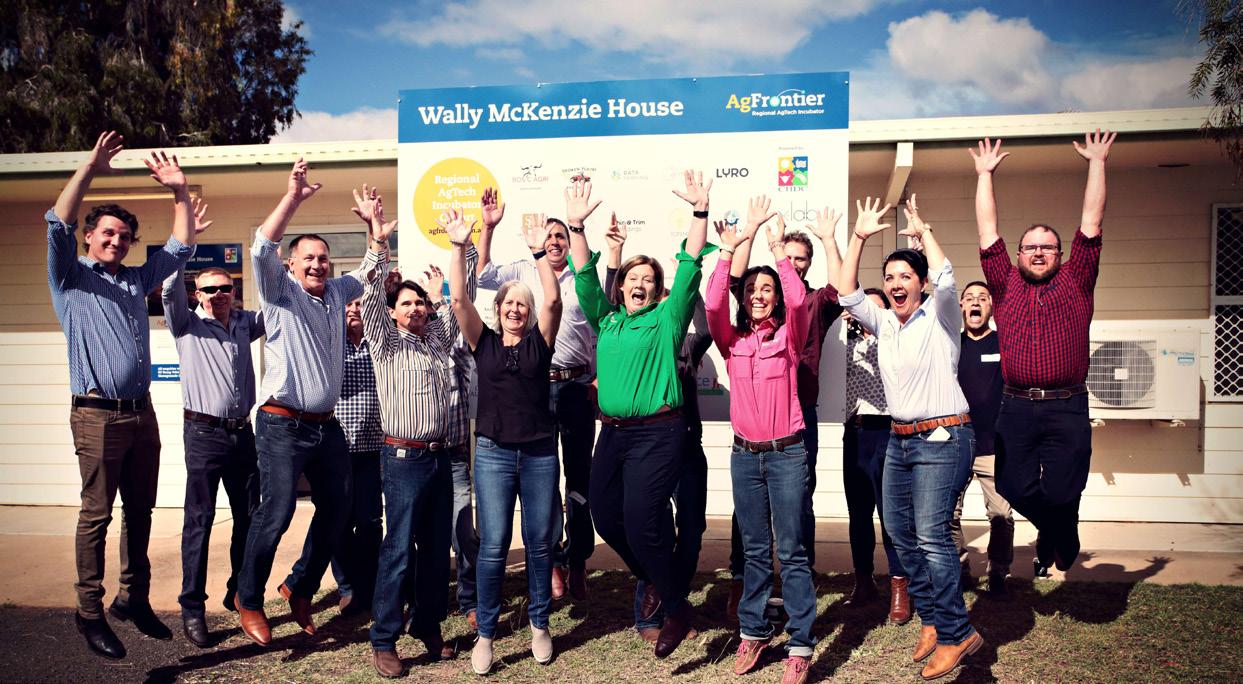
CHDC thanks the Australian Government’s Incubator Support initiative, the Local Buying Foundation, Advance Queensland and the Cotton Research and Development Corporation for their support and co-investment into the ground-breaking AgFrontier Regional Agtech Incubator.
What’s next? CHDC aims to run the Incubator every two years, with a localised program in the alternate year to more widely build entrepreneurial capability and a pipeline of quality startups with global potential.
Congratulations to the AgFrontier Inaugural Cohort
Business Founders
Completed Phase 1
BOS C AGRI One Platform
Broken Plains Pastoral Co
Top End Pollination
Phase 2 Graduates
Natalie Engel
Kurt Mayne, Lewis Rolfe & David Rolfe
Alan McIndoe
AG-TRIM Ben Harzer
Big Sky Technologies
DataFarming
Toby Harpham & Jason McNeice
Tim Neale & Peta Neale
Farmer meets Foodie Erica Hughes
Location
Rolleston
Rolleston
Emerald
Via Gayndah, Queensland
Toowoomba
Toowoomba
Mt Molloy
LYRO Juxi Leitner, Nicole Robinson & Norton Kelly-Boxall Brisbane
SwarmFarm Robotics
Andrew Bate & Jocie Bate
+ SwarmFarm Robotics was awarded 3rd place at the Future Agro Challenge, Global Agri-preneurs Summit in Greece in September 2019.
+ DataFarming was one of 13 selected from more than 300 international applicants to the TERRA Program’s IV cohort in San Francisco, only the 2nd Australian team to be accepted since TERRA’s inception.
+ DataFarming’s Tim Neale was awarded the QLD Pearcey ICT Entrepreneur Award, and DataFarming won the Innovation and Commercialisation category in October 2019.
+ Ag-Trim’s Ben Harzer was selected to tour Israel as part of Advance Queensland's Startup Catalyst Mission in November 2019.
+ LYRO Robotics secured seed funding in February 2020 from Japanese deep-tech investor Toyo Kanetsu to build AI-powered pick and pack robots.
+ At EvokeAG in Melbourne, Asia Pacific’s largest agtech event: SwarmFarm pitched at the invitation-only investor dinner; SwarmFarm and Lyro Robotics were two of 10 Australian startups selected as exhibitors in
Gindie
Startup Alley; DataFarming and GeoScience Australia were a popular trade display in the main exhibition hall; Founders from One Platform and Bos C Agri attended with the AgFrontier project team; AgFrontier coordinated 18 agribusinesses from Central QLD to attend.
+ SwarmFarm Robotics was among five finalists across the world selected to compete at the 2020 Radicle Challenge by Corteva Pitch Day. Led by the acceleration platform for early-stage ag and food technologies Radicle Growth, the online pitch was held in March 2020, after the postponement of the World Agri-Tech Innovation Summit in the US.
+ Big Sky Technologies and Data Farming – two of four regionally-based agtech businesses – engaged in a DAF and TSBE Digital Farming Collaboration Project in 2020 to transform Condamine Plains on the Darling Downs. It will demonstrate a collaborative approach to provide producers with one interconnected data system powered by multiple sensors, gateways, and software solutions in an easily consumable format.
+ Farmer Meets Foodie’s Erica Hughes was awarded best pitch on the night of the AgFrontier Finalé.
CHDC continued to work with stakeholders to identify and bridge the skills gaps for current and emerging jobs and industries in the Central Highlands.
The RSIS, supported by the Department of Employment, Small Business and Training (DESBT) and CHDC, worked to identify current and emerging jobs in key industry sectors and ensure there is a supply of skilled local people to meet this demand. The project was guided by a reference group comprised of stakeholders from the tourism, resources and agribusiness sectors.
Through consultations with the stakeholder groups and industry forums, it was recognised that there are current pathways for new and initial employment, such as apprenticeships, traineeships, internships and professional placements, however there is no funding on continual improvement of skills for participants who are seeking to advance in an organisation.
CHDC developed this program with Queensland Government funding, after the RSIS Reference Group and the Bridging the Skills Gap survey identified a deficiency in leadership and management skills for emerging and new supervisors and managers.
CQUniversity was engaged to deliver the face-to-face and online Team Leader Skills Set qualification, which included competencies in communication, effective workplace relationships, and implementing operational plans. Five cohorts, made up of a total of 60 people, completed the 12-week course. COVID forced the cancellation of the sixth cohort.
An online survey was conducted primarily in the first half of FY20 to gain feedback from local employers about skills needs and gaps in the Central Highlands.
Key findings:
+ Close to 62% of agribusiness respondents identified the need for advanced managerial skills.
+ 33 of the 54 respondents listed a need for managerial and leadership skills in their workforce, with ‘effective communication with all functional areas in an organisation’ achieving the strongest result at 83%.
+ Close to 77% of respondents from the tourism industry listed customer service and front office skill needs as ‘advanced’ and 33% identified that hotel/motel management skills also need to be advanced.
+ Drone skill requirements were listed as either ‘competent’ or ‘advanced’ by 43% agri respondents and 28% of respondents from the resources sector.
+ More than 80% of respondents listed the need for their workforce to have skills to work on mobile devices rather than from paper.
+ More than 38% of agribusiness respondents identified the need for advanced skills in environmental impacts of exotic disease; export processes and procedures; and animal health requirements.
One focal point of RSIS was the promotion of VET pathways and training available under the Queensland Government’s Annual VET Investment Plan.
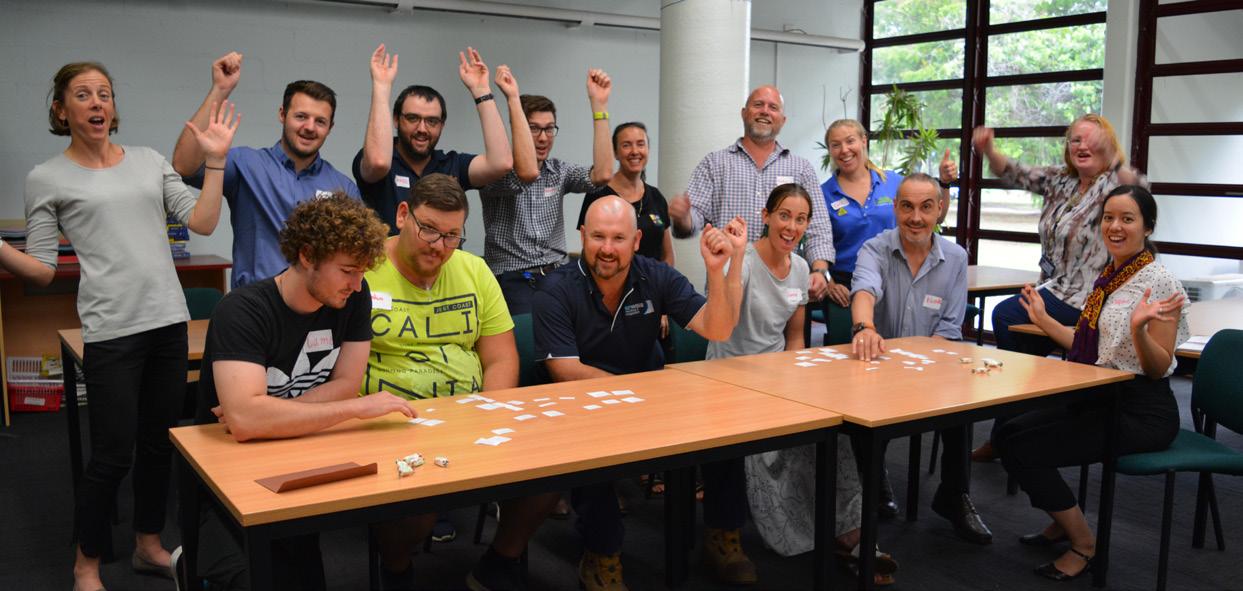
Graduates of the Team Leader Skills Set course were given extensive information to continue a Certificate IV in their selected field. Indeed, several students have elected to extend their studies.
CHDC also shared various VET opportunities via its eNews and social media channels, to grow awareness of the skills development potential.
This unique and free job search platform at cqjoblink.com. au was created by CHDC and Isaac Regional Council (IRC), with the support of Local Buying Foundation, in FY19. The initiative provided stakeholders real data for current skill requirements and available jobs.
Support and funding from Advance Queensland and other partners and sponsors enabled continued assistance to related programs of CHDC, including:
The Advancing Regional Innovation Program (ARIP, Fitzroy) entered its third year, with the State Government supported initiative to end on 30 September 2020.
Support and funding from Advance Queensland, and other partners and sponsors enabled CHDC to provide assistance to local businesses via a number of program areas and events: Agribusiness (AgTeCH19, AgFrontier), Tourism (real-time connectivity); Business Facilitation (the Central Highlands Business Excellence Awards) and the Industry and Innovation Forum. While much of the focus of ARIP is directed to the Central Highlands region, the collaboration and coordination of programs and events across the Fitzroy provides an opportunity to lift our profile and garner help for businesses where it is needed.
Through hosting the RCQIN Committee, CHDC continued to provide outreach to regional innovation managers, hubs, industry groups and business throughout the broader Fitzroy Region. There is interest to extend the RCQIN to other neighbouring regions – the Central West/Outback region and the Mackay-Isaac-Whitsunday regions. This would provide CHDC the opportunity to work collectively with Remote Area Planning and Development and the Greater Whitsunday Alliance to focus work on improving cross-regional matters such as digital connectivity and supply chain choke points.
In the tourism domain we generated a Situation Analysis/ Issues paper on real-time connectivity and means to better inform visitors of the appeal of the Central Highlands before and during their visits. This will enable us to secure funds to introduce different forms of digital technology to improve the value of tourism for businesses and communities. We are now planning a broader review of digital connectivity across the region, with State partners, to stimulate investment in infrastructure and set the framework for alternative networking systems incorporating Internet of Things technology.
The annual event on 25 July 2019 brought together about 100 participants to hear about opportunities for small business driven by big business investment, the need to be supply chain ready, businesses needing innovative mindsets and the value in collaboration and networking in business development. Keynote presentations were provided by various senior industry and government representatives, smaller businesses and business support agencies. The final session involved our own innovators reflecting on the future based on their experience along the innovation journey. The afternoon finished with a networking session.
One of CHDC’s most significant achievements has been the establishment of an inter-regional team to design and institute the Food and Fibre Plus project.
This has been supported by the Advance Queensland Regional Network Fund (RNF) and the Department of Agriculture (DAF, Central) through collaborative agreements. While hosted at CHDC within the Fitzroy Region, its regional partners include the MackayIsaac-Whitsunday and the Central West Queensland regions. The Sunshine Coast Innovation Centre is also involved in delivering capacity building related to benchmarking for change.
The project addresses the growing interest in crossindustry sectors such as waste to energy, agri-tourism, carbon farming, smart water management and the like,
CHDC and ARIP attracted 25 applications from across the Fitzroy region for support to attend this year’s QODE 2020 in March. QODE is Australasia’s chief digital technology and innovation event, it’s on the international calendar as a go-to congress and attracts over 1000 people each year. COVID-19 disrupted the event but it was delivered through virtual means. Networking opportunities were certainly missed. CHDC and Advance Queensland continue to be in contact with a range of these new innovators to ensure their journey continues. Five of the Fitzroy delegates from 2019 have since formed partnerships, attracted venture capital and/or acquired access to support. These results, as well as the increased interest in QODE this year, reflects on the value of this program.
CHDC supported this program of the VET Cluster Network (Central Highlands and Isaac), which sees students kicking goals in this arena for ‘future jobs’ and future businesses. Contact between students and local practitioners now occurs as part of the training delivered by UAVAIR, as well as Advance Graduate Training of students, in image processing, including data capture, data analysis and mapping.
across the Fitzroy and broader Central Queensland regions. It aims to set up an inter-regional coordination and collaboration mechanism to drive innovation and business development in rural and remote areas.
Food and Fibre Plus capitalises on the importance of the agri-sector in propelling new businesses associated with food and fibre production and local value-adding: processing, tourism, hospitality, small manufacturing and food retail industries. It will also focus on inter-regional scale matters such as water security, land management, supply chain characterisation and circular economy opportunities. The cluster development approach across the Central Queensland regions is critical for attracting consistency in support, resourcing, better leverage, focus and scaling of innovation to maximise benefits across regions.
Furthering student and youth training and capacity into the full ambit of multi-sensors, use of data, geo-spatial data analysis and use of geographic information systems (GIS) are topical. So too is the need to get young people with these skills into the workplace or to the point where they can set up their own businesses! Case ideas created by CHDC will target potential employers, including local government. Several students from the program have already joined a team of precision livestock specialists in submitting a grant proposal targeting sensors, and land and water management innovation in agribusiness.
Students and other collaborators are keen to explore the opportunity to bring this training and future career generation into the public arena. The program has also attracted interested from other regions to become involved.
Assistance to industry and business continued through advocacy, information assembly, advice and connecting developers with professional services, finance, investment providers and research providers. CHDC’s Regional Innovation and Development Officer and Business Investment and Attraction Manager worked together to assist those with new business or development ideas, those keen on extending development, and parties interested in investing for the future. There is a strong link with Council’s development planning team.
Our team was honoured to be inducted into the CHDC Business Excellence Awards Hall of Fame in 2019. The Awards process is comprehensive and is a prompt for us to continually examine our business. Being an Award winner is a very powerful marketing statement as well. Now, as a Hall of Fame inductee, our company can demonstrate that our commitment to excellence has been recognised through the Awards process.”
Bronwyn Reid Director, 4T ConsultantsCapricorn Enterprise, as one of Queensland’s 13 official Regional Tourism Organisations (RTO) representing a large part of CQ from the beautiful Central Highlands in the west all the way to the Keppel Islands in the east, was thrilled to be invited to present at the Tourism & Events forum.
It was a great opportunity to present opportunities for a diverse range of businesses, events teams, industry representatives and Council members to partner, collaborate and leverage local, regional and state activities within the tourism industry.”
Kerry Kerr Tourism Marketing Manager, Capricorn EnterpriseSwarmFarm
AgTeCH17 & 19 were an excellent mix of stakeholder engagement to attract a wide audience. For us as a start-up with limited resources, it was a great way to showcase our team and technology. We were also able to connect with several potential customers as well as form relationships with other agtech companies who may provide future collaboration partnerships. This is an event not to be missed and we look forward to getting involved again at AgTeCH21.”
Jocie Bate Director and CFO, SwarmFarm RoboticsThe Central Highlands Business Excellence Awards have been incredibly valuable to our company. The comprehensive entry process was an opportunity for us to look deeper into our business and consider where we are going and how to get there. Of course, we are also very honoured to have won several categories – including 2013, 2015 and 2017 Business of the Year – and this has helped to further raise our profile and cement our reputation in our industry.”
Kym Hellmuth Company Manager, H.E.M.E Pty LtdBusiness Facilitator Mary Ryan’scommitment and support with helping businesses grow and flourish in the Central Highlands community has not gone unnoticed and we couldn’t be more personally thankful for her contribution. Mary constantly amazes us with her knowledge base and outstanding communication skills and we hope to continue our working relationship with her long into the future.
Dr. Angela Sutherland DVM Director & Veterinarian, Maraboon Vet Surgery & Maraboon Pet ResortCHDC has been a brilliant resource for me, and Business Facilitator Mary Ryan has been a steady support and listening ear. I happily and frequently recommend CHDC to support any local small business that values a professional and highly competent approach, and who wants to thrive in our community.”
Rene Thompson Clean Living Healthy MindIt was an absolute pleasure working with the team at CHDC in developing the Visitor Economy Strategy. The support from the staff in bringing together industry and key stakeholders allowed us to develop a relevant, targeted and achievable strategy. It is very exciting to see this strategy being activated from day one, with passion and dedication from CHDC staff and supporting industry representatives. We can’t wait to see the success unfold.”
Linda Tilman Managing Director, Tilma Group2017–18
+ Hosted the inaugural AgTeCH and 3rd Business Excellence Awards.
+ Launch of the Central Highlands Economic Master Plan).
+ Digital Telecommunications Audit and Action Plan in partnership with CHRC
+ Central Highlands Agriculture Video: More than you expect!
+ Famil to Japan with CHRC representatives to develop regional investment.
2018–19
+ Implementation of Tourism Engagement Groups: Tourism Alliance Network, Tourism Action Group and Tourism Advisory Panel.
+ Liveability video: Work, Play, Discover Central Highlands.
+ Launched CQ Job Link
2019–20
+ Launched inaugural AgFrontier Regional Agtech Incubator and Food and Fibre Plus.
+ Delivered Central Highlands Visitor Economy Strategy 2020-2022.
+ Hosted 4th Central Highlands Business Excellence Awards and 2nd AgTeCH.
+ Widespread business support in response to Coronavirus pandemic.
+ CHDC Governance: Organisational review and growth with addition of 3 Independent Directors to the Board.


